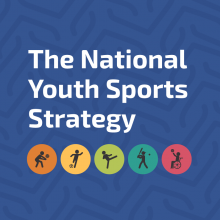The benefits of youth sports are wide reaching and go well beyond those associated with physical activity. In addition to helping youth achieve their 60 minutes of daily physical activity, participation in sports can help kids learn the vital skills they need to succeed in life, like teamwork and leadership. Playing sports can also help kids develop social skills, build their self-esteem, and improve their focus and memory. Despite these benefits, not all youth have equitable access to sports opportunities, and the COVID-19 pandemic has posed many challenges to keeping youth engaged.
Communities can leverage youth sports as a tool for positive change, but doing so will require a collaborative effort with a diverse set of voices from different sectors and levels of society. Building off efforts in 2020, ODPHP brought together representatives from over 150 organizations through a series of five National Youth Sports Strategy Virtual Workshops in 2021. The workshop series gave participants a chance to build connections; share resources; and discuss how to create safe, fun, inclusive, developmentally appropriate, and accessible youth sports opportunities.
Local steering committees helped drive each workshop, ensuring the organizations represented and topic areas of focus were relevant to each community. Despite these differences, common themes emerged across all workshops.
Challenges
At each workshop, participants discussed barriers to improving youth sports in their community. These discussions reinforced that participants were not alone in the challenges they faced:
- Lack of funding sources
- Limited formal training for coaches and difficulty recruiting and retaining volunteers
- Limited access to facilities and infrastructure
- Low awareness of sports programs and offerings among the public
- Competition outweighing fun and youth development in many programs
Solutions
Participants then brainstormed solutions or opportunities to overcome the challenges they identified:
- Identify grant and funding opportunities from companies, nonprofits, and other organizations that serve the community
- Centralize and formalize educational and certification programs for coaches and volunteers
- Partner with local policymakers and decision makers (including school administrators and officials), local businesses, and organizations to share community spaces, identify multiuse facilities, and improve transportation options
- Build capacity and awareness of programs by collaborating with other sports and community organizations
- Expand “just for fun,” pick-up, and informal options for kids
Partnerships
A goal of these workshops was to help participants move into action planning, so after discussing challenges and brainstorming solutions, participants identified potential partners that could help them actualize their ideas. To drive their next steps, participants discussed reaching out to parents and schools, both local school systems and universities; local elected officials and policy makers; organizations that would help them better connect with their community, such as park and recreation departments, community centers, and faith-based organizations; healthcare organizations including insurers, providers, and hospital networks; local sports teams at the professional, amateur, and recreational level; and national sports governing bodies.
Participants left the workshops feeling aligned in their efforts, optimistic about the future of youth sports in their communities, and eager to engage with new and existing partners. Partnerships across a variety of sectors—including business, community recreation, education, faith-based, government, health care, media, public health, sports, and technology—are integral to improving the U.S. youth sports landscape. To get involved, apply to join the NYSS Champions partnership initiative or use the online directory to find potential partners near you.




